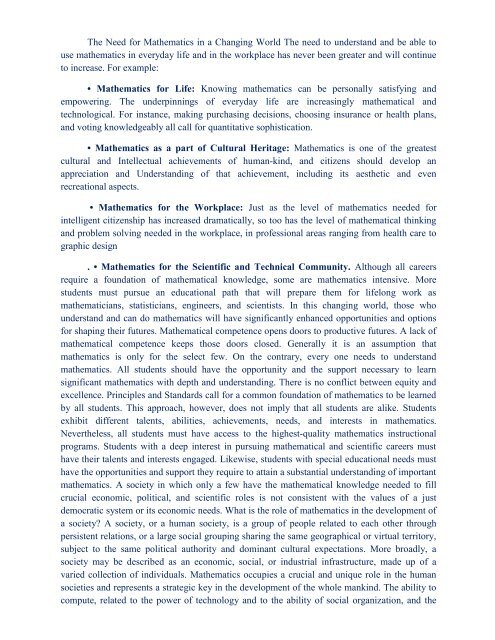Mag Finall color
You also want an ePaper? Increase the reach of your titles
YUMPU automatically turns print PDFs into web optimized ePapers that Google loves.
The Need for Mathematics in a Changing World The need to understand and be able to<br />
use mathematics in everyday life and in the workplace has never been greater and will continue<br />
to increase. For example:<br />
• Mathematics for Life: Knowing mathematics can be personally satisfying and<br />
empowering. The underpinnings of everyday life are increasingly mathematical and<br />
technological. For instance, making purchasing decisions, choosing insurance or health plans,<br />
and voting knowledgeably all call for quantitative sophistication.<br />
• Mathematics as a part of Cultural Heritage: Mathematics is one of the greatest<br />
cultural and Intellectual achievements of human-kind, and citizens should develop an<br />
appreciation and Understanding of that achievement, including its aesthetic and even<br />
recreational aspects.<br />
• Mathematics for the Workplace: Just as the level of mathematics needed for<br />
intelligent citizenship has increased dramatically, so too has the level of mathematical thinking<br />
and problem solving needed in the workplace, in professional areas ranging from health care to<br />
graphic design<br />
. • Mathematics for the Scientific and Technical Community. Although all careers<br />
require a foundation of mathematical knowledge, some are mathematics intensive. More<br />
students must pursue an educational path that will prepare them for lifelong work as<br />
mathematicians, statisticians, engineers, and scientists. In this changing world, those who<br />
understand and can do mathematics will have significantly enhanced opportunities and options<br />
for shaping their futures. Mathematical competence opens doors to productive futures. A lack of<br />
mathematical competence keeps those doors closed. Generally it is an assumption that<br />
mathematics is only for the select few. On the contrary, every one needs to understand<br />
mathematics. All students should have the opportunity and the support necessary to learn<br />
significant mathematics with depth and understanding. There is no conflict between equity and<br />
excellence. Principles and Standards call for a common foundation of mathematics to be learned<br />
by all students. This approach, however, does not imply that all students are alike. Students<br />
exhibit different talents, abilities, achievements, needs, and interests in mathematics.<br />
Nevertheless, all students must have access to the highest-quality mathematics instructional<br />
programs. Students with a deep interest in pursuing mathematical and scientific careers must<br />
have their talents and interests engaged. Likewise, students with special educational needs must<br />
have the opportunities and support they require to attain a substantial understanding of important<br />
mathematics. A society in which only a few have the mathematical knowledge needed to fill<br />
crucial economic, political, and scientific roles is not consistent with the values of a just<br />
democratic system or its economic needs. What is the role of mathematics in the development of<br />
a society? A society, or a human society, is a group of people related to each other through<br />
persistent relations, or a large social grouping sharing the same geographical or virtual territory,<br />
subject to the same political authority and dominant cultural expectations. More broadly, a<br />
society may be described as an economic, social, or industrial infrastructure, made up of a<br />
varied collection of individuals. Mathematics occupies a crucial and unique role in the human<br />
societies and represents a strategic key in the development of the whole mankind. The ability to<br />
compute, related to the power of technology and to the ability of social organization, and the





